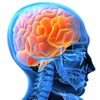Magnetic treatment helps stroke patients communicate
Magnetic stimulation of the brain could help improve language skills of stroke survivors with aphasia, according to research by The University of Queensland.
Dr Caroline Barwood, who recently completed her PhD at UQ’s School of Health and Rehabilitation Sciences, conducted the research and found significant improvement in the language skills of stroke patients after they underwent Transcranial Magnetic Stimulation (TMS).
TMS is a non-invasive method that seeks to target brain activity, with the intention to facilitate the reorganisation of brain regions with the purpose to alter language behaviours.
The treatment involves placing a coil on the head of the participant which uses electromagnetic induction to induce weak electric currents through a changing magnetic field.
Twelve patients who experienced strokes between one and six years prior to the study were recruited for participation and treated at the UQ Centre for Neurogenic Communication Disorders Research.
“Eighty percent of patients who were treated with TMS showed improvements in language skills, most notably in expressive language, which includes naming, repetition, and discourse. No language improvements were seen for those patients treated with placebo TMS,” Dr Barwood said.
Guided by a state-of-the-art neuronavigational system, magnetic resonance imaging (MRI) was used to pin point the stimulation site for two sets of five-day treatments.
Dr Barwood said changes in patients’ language scores were measured on standardised speech pathology tests.
“The research strongly demonstrates that TMS may be a very useful and safe treatment method. Overall it has generated exciting discussion regarding the direction of treatment and the considerable impact this may have in the future to decrease the cost of rehabilitation,” she said.
Dr Barwood explains the technique differs to traditional language therapy, which uses behavioural methods, and said in the future the two methods may be used together.
Dr Barwood’s PhD has been reviewed by a number of journals across fields of neurology and speech pathology and was published in peer-reviewed journals; The European Journal of Neurology; Brain and Language; Brain Stimulation; and Neurorehabilitation.
Dr Barwood said in light of the very positive results, she is seeking to continue and extend the current methodology to include a larger sample as a clinical trial.
(Source: The University of Queensland: The European Journal of Neurology)
More information
 | For more information on brain health, including the anatomy of the brain, the effects of nutrition and exercise on the brain, and the effect of mental activity on health, see Brain Health. |
Dates
Tags
Created by:

 Login
Login














